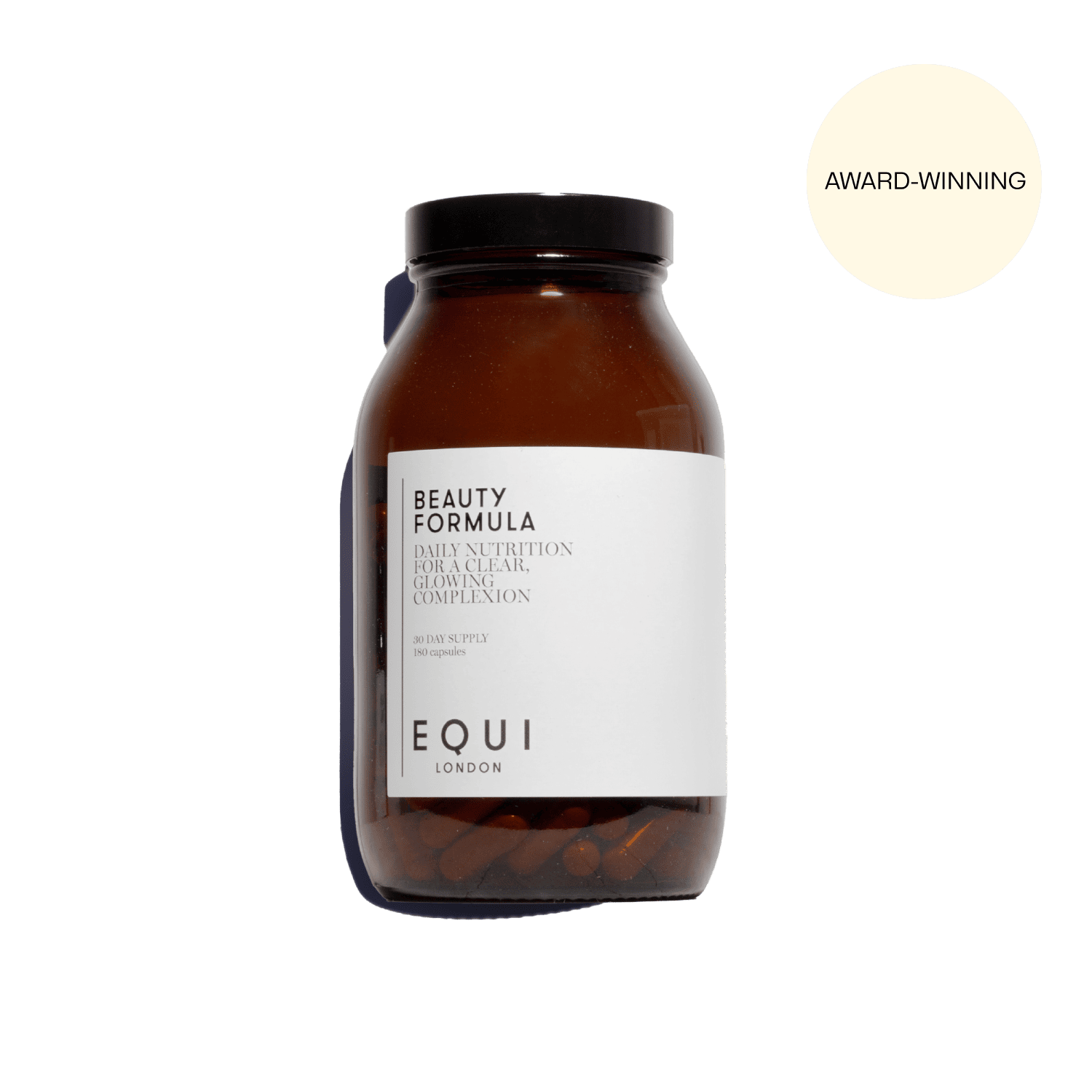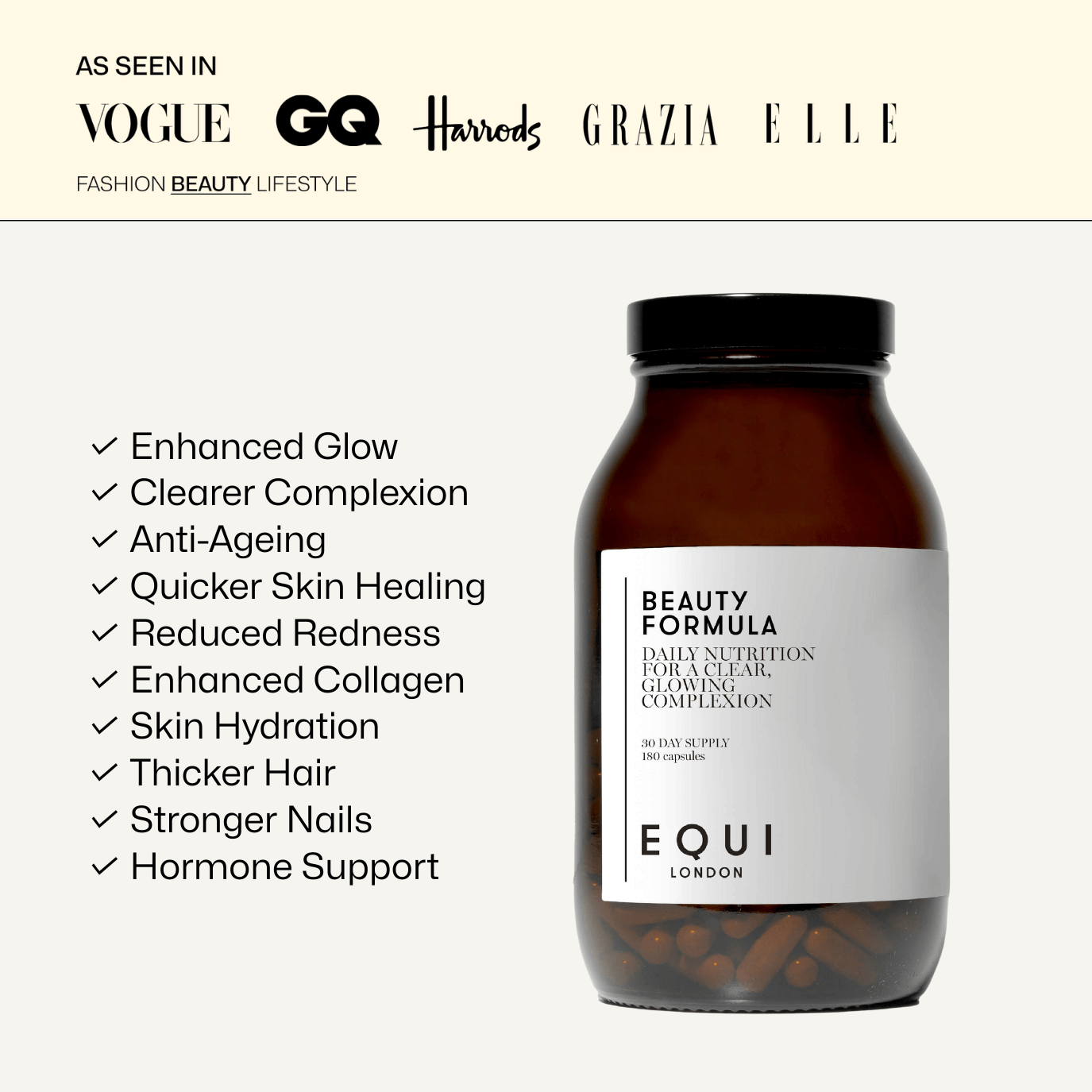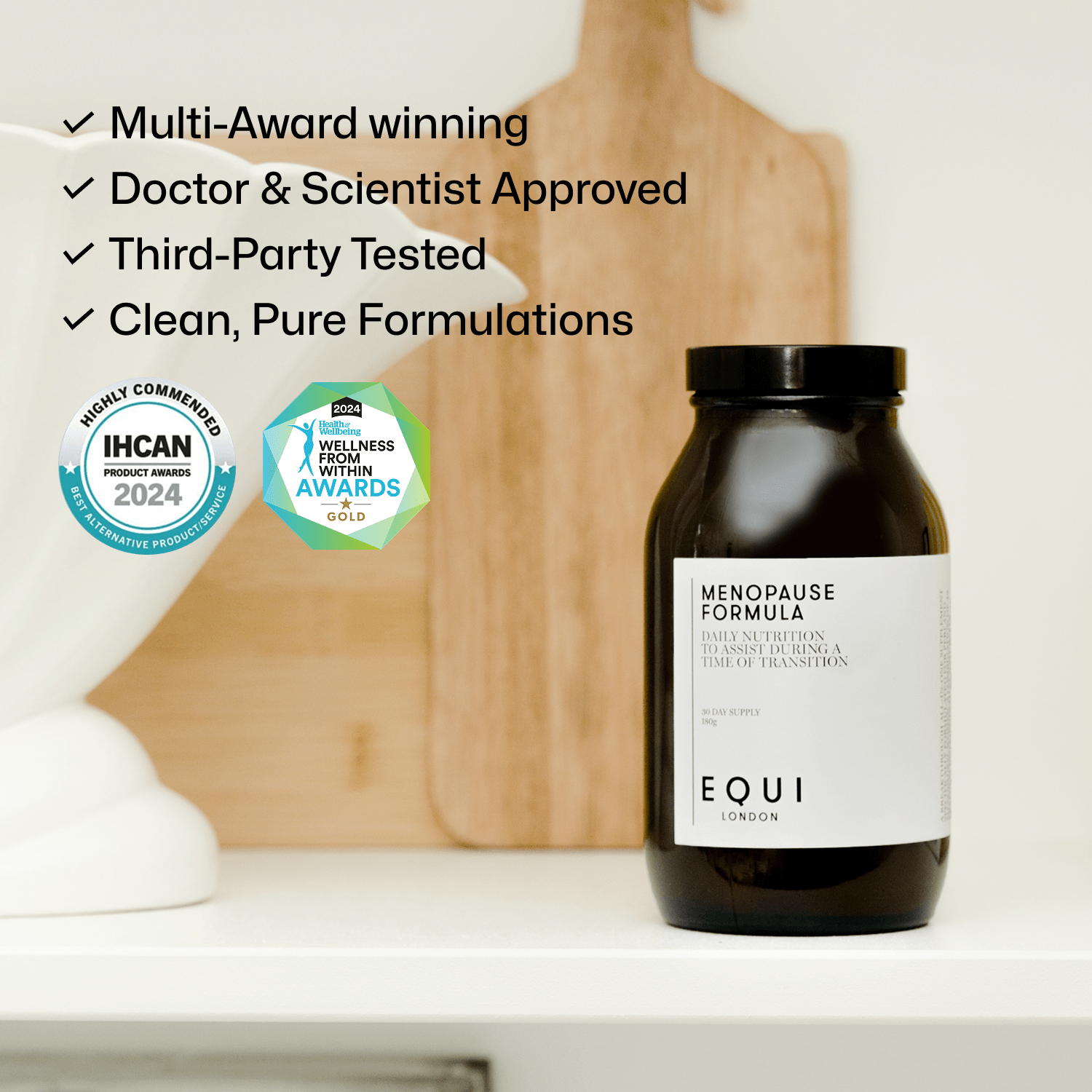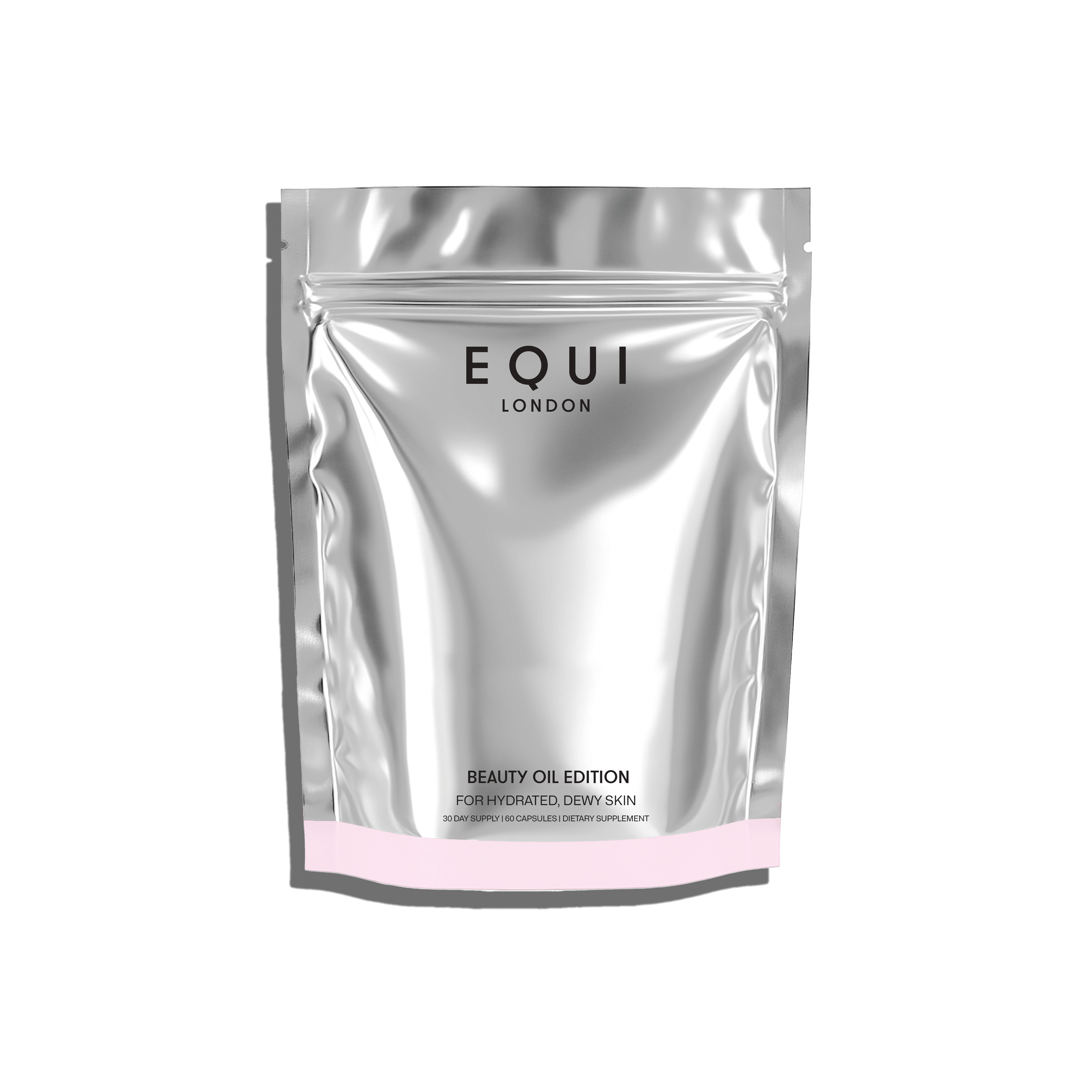
Caffeine - it’s a morning ritual for so many of us. Whether it's an oat milk barista flat white, a supersized latte with all the extras or a standard cup of tea, many of us lean on caffeine to kickstart our day, or to provide that mid-afternoon boost. But there's more to caffeine than its energy boosting properties. In fact, for centuries, it has played an integral role in various cultures, dictating rituals, social gatherings, and even economies. Caffeine is not just about staying alert; its impact on the human body is multi-faceted. From influencing our mood to our gut microbiome, supporting weight loss, and influencing nutrient absorption, caffeine has many health considerations. We have harnessed its powerful benefits and included green coffee bean extract in Lean Formula, which is a nourishing and stimulating powdered complex of 50 vitamins, minerals, herbs, probiotics, superfoods and active ingredients to help boost the metabolism and enhance energy.
Our intake of caffeine should be considered carefully. Naturally found in more than 60 plants, caffeine is a central nervous system stimulant. Its most immediate effect is a temporary warding off drowsiness and restoring alertness, a reason it finds itself in our daily routines. Many of us swear by our morning caffeine hit, citing improved focus and better mood, supporting fasted workouts, or giving us that much needed afternoon boost. Whilst it does provide some benefits, at what point is this line crossed? Simply put, how much is too much? What’s more some sources have additional benefits too. For example, matcha or green tea promises sustained energy without the jitters thanks to its antioxidant properties. Beyond personal preferences, traditions, and rituals, the latest research into caffeine may guide us on its pros and cons, providing insights into caffeine's real effects on our physiology.
Caffeine Content – Everything You Need to Know
Caffeine, the world’s favourite stimulant, is not merely confined to our morning brew. It’s found in a myriad of our foods, from the more obvious coffee or tea to chocolate, energy drinks and the lesser-known guarana and yerba mate plants. Knowing the caffeine content across sources is paramount for ensuring we harness its benefits whilst avoiding its potential drawbacks. Let's begin with two favourites: black tea and coffee. A standard small cup of black tea contains between 40-70 mg of caffeine, whereas a similar-sized cup of coffee boasts anywhere between 95-200 mg (1). What’s more, it also depends on how many shots of coffee are in your drink too. So, next time you are ordering your coffee, take note of your barista!
The significant difference of caffeine in tea versus coffee is simply because coffee beans naturally contain more caffeine than tea leaves. Yet, it’s not just the source; preparation plays a crucial role too. For example, steeping tea for a longer time will generally increase its caffeine content. Similarly, the method of coffee preparation impacts its caffeine punch. For instance, an espresso, despite its smaller volume, is more concentrated and can contain as much caffeine as, if not more than, a regular-sized coffee (2). The caffeine content can also vary based on the type of beans and leaves. For instance, Arabica beans usually have half the caffeine of Robusta beans (3). In teas, black and oolong teas generally contain more caffeine than green or white teas, though this can vary based on specific processing and growing conditions.
Then there’s chocolate. Most of us might not consider it a significant caffeine source, but it does contain it, albeit in smaller amounts. A standard piece of dark chocolate has about 12 mg of caffeine, whereas milk chocolate contains less than half of that (4). The caffeine in chocolate comes from the cocoa beans, so, with dark chocolate which has a higher cocoa content, it will naturally contain more caffeine.
Lean Formula has harnessed the power of caffeine not directly from brewed coffee but from green coffee bean extract. Green coffee beans are simply unroasted coffee beans, and the extract from these beans is rich in chlorogenic acid, which can aid in weight loss and boost metabolic function (5). When combined with its caffeine content, it can potentially enhance brain function too.
Lean Formula is a nourishing and stimulating complex of 50 vitamins, minerals, herbs, probiotics, superfoods, and active ingredients to help boost the metabolism, enhance energy, curb cravings, prolong satiety and support hormones and adrenals. With the inclusion of green coffee bean extract, it provides a balanced, focused energy boost without the jitters often associated with caffeine.
Matcha vs. Coffee
Matcha, a shade-grown green tea from Japan, has been hailed for centuries not just for its vibrant green hue but also for its plethora of health benefits. As the popularity of matcha continues to rise, many are drawn to its distinctive profile of energy-boosting without the after-crash. But how does it compare with our beloved coffee?
Caffeine Content & Energy
While a typical serving of matcha contains less caffeine than coffee - around 35mg per half teaspoon compared to 95-200mg in a standard cup of coffee, the experience of this caffeine hit is notably different. In matcha, caffeine is released slowly over time due to its unique combination with catechins, a type of antioxidant. This means that instead of a rapid spike in energy followed by a sharp crash (as seen with coffee), matcha delivers a gentle and sustained lift over 3-6 hours (6).
Calming L-Theanine
One of the shining stars in matcha is L-Theanine, an amino acid that promotes relaxation without drowsiness. L-Theanine, when combined with caffeine, provides an unparalleled sense of calm, alert focus. This synergy explains the paradox of matcha - it can invigorate and calm simultaneously. This 'alert calmness' from L-Theanine counters the potential jitters from caffeine, offering a balanced and sustained energy (7).
Polyphenols & Their Health Benefits
Both Matcha and coffee are rich in polyphenols, antioxidants known for their potential health benefits. Matcha, being the whole tea leaf ground into a powder, contains a unique class of polyphenols known as EGCG (epigallocatechin gallate), which has been studied for its potential metabolism-boosting effects, and role in heart health (8). Coffee, on the other hand, is a rich source of chlorogenic acids, which are touted for their antioxidant properties and potential to reduce blood pressure (9). While their profiles differ, both beverages offer a potent dose of antioxidants that can contribute to overall health and wellbeing. What’s more, research suggests that polyphenols can favourably modify the gut microbiota. For instance, one study observed that green tea polyphenols promoted the growth of beneficial bacteria while inhibiting harmful ones (10). Similarly, coffee consumption has been associated with increased levels of the beneficial Bifidobacterium species (11). By fostering a healthier gut microbiome, these beverages may aid in digestion, boost immunity, and even mitigate inflammation.
Choosing between matcha and coffee ultimately depends on personal preferences. For those seeking a gentle, prolonged energy lift without the jitters, and a healthy dose of antioxidants to boot, matcha might be the beverage of choice. Coffee, with its robust flavour and aroma, remains a comforting and energising classic. Either way, understanding the nuances of these beverages enables more informed and enjoyable consumption.
How Green Coffee Bean Extract Works In Lean Formula
Green coffee bean extract (GCBE) has gained considerable attention in the health community due to its potential to boost the metabolism, brain function and energy, aiding in weight loss. The extract itself is derived from unroasted coffee beans, retaining a unique composition distinct from roasted coffee. The primary active compound credited for its metabolism boosting effects of GCBE is chlorogenic acid. Chlorogenic acid has been shown to influence glucose metabolism. One study found that when consuming GCBE there is a significant reduction in glucose absorption, which could lead to the body utilising stored fat reserves for energy, therefore aiding in weight loss (12). In fact, another study concluded that GCBE can cause modest weight loss (13). While GCBE contains caffeine, the amount is typically less than what's found in roasted coffee. Still, the combination of caffeine with chlorogenic acid appears to provide a sustained energy release, preventing the sharp spikes and subsequent crashes associated with other caffeine sources. This dual effect might aid in enhancing endurance and stamina as chlorogenic acid helps improv energy metabolism (14). In terms of brain function, while the caffeine content in GCBE is lesser than roasted coffee, it can still provide cognitive benefits. Caffeine is known to stimulate the central nervous system, enhancing alertness, and improving cognitive functions.
Incorporating green coffee bean extract in Lean Formula can offer a two-fold advantage - aiding weight loss by potentially adjusting glucose metabolism and fat utilisation while also providing a gentle and sustained energy lift. Combined with its advanced multivitamin and mineral blend, Lean Formula contains a comprehensive spectrum of bio-available vitamins and minerals calibrated for optimum female health, targeted at energy, metabolism, and weight management. This makes Lean Formula an attractive option for those seeking weight management support without the over-stimulation linked with many commercial weight loss supplements.
However, while green coffee bean extract presents promising advantages, it's essential to recognise that genuine, long-term weight loss and energy benefits come from a holistic approach. This includes balanced nutrition, regular physical activity, and adequate rest. Green coffee bean extract, as part of Lean Formula, should be considered a supportive component of a comprehensive wellness regimen.
Why Swiss Water Decaf Is Better For You
For those of us who prefer their coffee without caffeine, choosing a decaffeination method that preserves both the flavour of the beans and health is essential. The Swiss Water Process stands out as a method that effectively removes caffeine without the use of harmful chemicals, aligning perfectly with a health-conscious lifestyle. Originating in Switzerland in the 1930s, the Swiss Water Process is a pioneering decaffeination method that's entirely chemical-free. The process begins by soaking green coffee beans in hot water, which extracts both the caffeine and flavour compounds. The liquid is then passed through a carbon filter that captures the caffeine, leaving behind a solution rich in flavour compounds. This caffeine-free solution, known as "flavour-charged water," is then used to soak a new batch of coffee beans. As osmosis occurs, caffeine from the beans moves into the water, but the essential flavour compounds remain intact since the water is already saturated with flavour. The result? Coffee beans that are 99.9% caffeine-free but still bursting with their natural taste (15).
On the flip side, conventional methods of decaffeinating coffee beans use solvents like methylene chloride or ethyl acetate. Though these chemicals are purged from the beans post-process, trace amounts might remain, posing potential health risks. For instance, methylene chloride is classified as a potential human carcinogen when inhaled, raising concerns about its ingestion even in trace amounts (16). Given such risks, the Swiss Water Process emerges as a clear winner for those aiming for a toxic-free, healthier lifestyle. By eliminating the need for chemicals, this method ensures that what you're sipping is pure, delicious coffee, devoid of any potential contaminants.
The Hidden Aspects of Caffeine
Whilst it’s clear that there are many benefits of caffeine, it's crucial to delve deeper and understand some of its more intricate interactions, particularly when it comes to nutrient absorption.
Tannins Inhibit Iron and Calcium
Both tea and coffee contain tannins, polyphenolic compounds known for their astringent properties. While tannins have antioxidant benefits, they also bind with certain minerals, notably iron and calcium (to a lesser extent), inhibiting their absorption in the digestive tract. In fact, one study found that tea could reduce iron absorption by 60-70% when consumed with a meal (17). This effect is particularly concerning for individuals prone to iron-deficiency anaemia or those trying to maximise their dietary iron intake. When planning supplementation, especially with iron or calcium, it's advisable to separate the timing of consumption of these supplements from tea or coffee by at least an hour. This strategy ensures that the minerals are absorbed without significant interference from the tannins.
False Energy
The immediate boost one feels after a cup of coffee isn't a surge of energy; it's mainly due to caffeine blocking adenosine receptors in the brain. Adenosine is a neurotransmitter that promotes relaxation and sleepiness. While caffeine keeps you alert, it's not providing genuine energy. Relying on it as a primary energy source is misguided. Vital nutrients, such as B vitamins and iron, play direct roles in energy production at a cellular level. Using caffeine as a band-aid to mask fatigue can lead to neglecting dietary sources of these essential nutrients. We have included both a spectrum of B vitamins and iron within Lean Formula, providing you with all the nutrients needed to support your energy levels.
Caffeine’s Effect on Adrenals, and Hormones
Overconsumption and dependency on caffeine can put undue stress on the adrenal glands, leading to imbalances in stress hormones like cortisol. High cortisol levels, especially in the evening, can disrupt sleep patterns and overall circadian rhythm. Additionally, excessive caffeine can interfere with female hormones, potentially leading to menstrual irregularities and other hormonal imbalances (18).
So, while caffeine has its place in our diets, understanding its broader impacts is vital. Let your tea or coffee ritual be one of mindfulness, not just habit. And always remember that true energy comes from nourishing your body holistically and making informed choices!
How To Navigate Caffeine’s Downsides
We all know that consuming too much caffeine can lead to restlessness, insomnia, headaches, dizziness, and a slew of other symptoms. By being aware of how much caffeine we're consuming, we can potentially minimise adverse effects. But how much is too much?
And how can we counterbalance its affects? Here are some of our top tips for consuming caffeine:
Curb your afternoon caffeine intake - Sleep is crucial for cognitive function, mood regulation, and overall health. Caffeine, being a central nervous system stimulant, can significantly interfere with our sleep patterns. One study found that consuming caffeine up to six hours before bedtime reduced total sleep time by more than 1 hour (19). This is because caffeine blocks adenosine receptors, delaying the onset of sleep and reducing the amount of deep sleep experienced. Given its impact on sleep, it's wise to consider when we consume caffeine. A practical approach is to refrain from coffee after lunchtime. This allows enough time for its effects to wear off, ensuring it doesn't interfere with our night's rest.
Swap your coffee for matcha - Ever felt your hands trembling post that extra cup of coffee? Caffeine stimulates the release of adrenaline, the "fight-or-flight" hormone. This can lead to heightened alertness but can also result in feelings of anxiety, restlessness, and even palpitations. On the other hand, the L-Theanine found in matcha counters the potential jitters from caffeine, offering a balanced and sustained energy, providing ‘alert calmness’. Swapping your morning caffeine hit for a matcha latte or green tea will mean you are still benefitting from the energy boost, without the jitters.
Stick to the recommended daily intake - According to the European Food Safety Authority (EFSA), the safe amount of caffeine intake from all sources is 400mg per day for adults, roughly equivalent to two-four cups of brewed coffee. Meanwhile, pregnant women should limit their intake to 200mg daily (20). Don’t forget you also need to consider your caffeine intake from other sources such as tea and dark chocolate to stay within the recommended daily intake.
Know your own personal limits - Genetics play a role in our sensitivity to caffeine. Some people have a version of a gene that breaks down caffeine quickly, while others metabolise it more slowly. This genetic variation can partly explain why some individuals can drink coffee before bed and sleep soundly, while others feel wide awake from a mid-afternoon tea. Like most things in life, moderation is essential. Pay attention to your body, and if you notice adverse effects, consider reducing your intake.
Quality over quantity - Opt for high-quality coffee beans, preferably organic, to avoid impurities that might amplify the negative effects of caffeine. When it comes to decaf, choose Swiss Water Method decaf versus conventional decaf methods. We love Exhale coffee, which is touted for being ‘ridiculously healthy coffee’, what’s more it’s organic and offers a Swiss Water Decaf blend.
Stay Hydrated - Caffeine is diuretic, meaning it makes you urinate more. Ensure you're drinking enough water throughout the day to stay hydrated. A good strategy would be to consume a glass of water for every caffeinated drink, aiming for 8-10 glasses water per day or 2-2.5L.
References
-
Mitchell, D. C., Knight, C. A., Hockenberry, J., Teplansky, R., & Hartman, T. J. (2014). Beverage caffeine intakes in the U.S. Food and Chemical Toxicology, 63, pp. 136-142.
-
Poole, R., Kennedy, O. J., Roderick, P., Fallowfield, J. A., Hayes, P. C., & Parkes, J. (2017). Coffee consumption and health: umbrella review of meta-analyses of multiple health outcomes. BMJ, j5024.
-
McCusker, R. R., Goldberger, B. A., & Cone, E. J. (2003). Caffeine content of specialty coffees. Journal of analytical toxicology, 27(7), pp. 520-522.
-
Katz, D. L., Doughty, K., & Ali, A. (2011). Cocoa and chocolate in human health and disease. Antioxidants & redox signaling, 15(10), pp .2779-2811.
-
Onakpoya, I., Terry, R., & Ernst, E. (2011). The use of green coffee extract as a weight loss supplement: A systematic review and meta-analysis of randomised clinical trials. Gastroenterology research and practice, p. 382852.
-
Dietz, C., Dekker, M., & Piqueras-Fiszman, B. (2017). An intervention study on the effect of matcha tea, in drink and snack bar formats, on mood and cognitive performance. Food Research International, 99, pp. 72-83.
-
Dodd, F. L., Kennedy, D. O., Riby, L. M., & Haskell-Ramsay, C. F. (2015). A double-blind, placebo-controlled study evaluating the effects of caffeine and L-theanine both alone and in combination on cerebral blood flow, cognition and mood. Psychopharmacology, 232(14), pp. 2563-2576.
-
Weiss, D. J., & Anderton, C. R. (2003). Determination of catechins in matcha green tea by micellar electrokinetic chromatography. Journal of Chromatography A, 1011(1-2), pp. 173-180.
-
Ochiai, R., Jokura, H., Suzuki, A., Tokimitsu, I., Ohishi, M., Komai, N., ... & Hase, T. (2014). Green coffee bean extract improves human vasoreactivity. Hypertension Research, 27(10), pp. 731-737.
-
Yuan, S., Cohen, D. B., Ravel, J., Abdo, Z., & Forney, L. J. (2020). Evaluation of methods for the extraction and purification of DNA from the human microbiome. PloS one, 5(3), e0121659.
-
Jaquet, M., Rochat, I., Moulin, J., Cavin, C., & Bibiloni, R. (2009). Impact of coffee consumption on the gut microbiota: a human volunteer study. International journal of food microbiology, 130(2), pp. 117-121.
-
Thom, E. (2007). The effect of chlorogenic acid enriched coffee on glucose absorption in healthy volunteers and its effect on body mass. Journal of International Medical Research, 35(6), pp. 900-908.
-
Onakpoya, I., Terry, R., & Ernst, E. (2011). The use of green coffee extract as a weight loss supplement: A systematic review and meta-analysis of randomized clinical trials. Gastroenterology Research and Practice, p. 382852.
-
Watanabe, T., Arai, Y., Mitsui, Y., Kusaura, T., Okawa, W., Kajihara, Y., & Saito, I. (2006). The blood pressure-lowering effect and safety of chlorogenic acid from green coffee bean extract in essential hypertension. Clinical and Experimental Hypertension, 28(5), pp. 439-449.
-
Ribeiro, D. B., Teófilo, R. F., Salva, T. J. G., & Ferreira, M. M. C. (2019). Simultaneous optimization of the decalcification and flavor of coffee in the Swiss Water Process using a rotated central composite design. Food Chemistry, 272, pp. 630-637.
-
U.S. Environmental Protection Agency. (2011). Methylene Chloride. Integrated Risk Information System. Retrieved from EPA website.
-
Zijp, I. M., Korver, O., & Tijburg, L. B. (2000). Effect of tea and other dietary factors on iron absorption. Critical Reviews in Food Science and Nutrition, 40(5), pp. 371-398.
-
Nehlig, A. (2018). Effects of coffee/caffeine on brain health and disease: What should I tell my patients? Practical Neurology, 18(2), pp. 89-95.
-
Drake, C., Roehrs, T., Shambroom, J., & Roth, T. (2013). Caffeine effects on sleep taken 0, 3, or 6 hours before going to bed. Journal of Clinical Sleep Medicine, 9(11), pp. 1195–1200.
-
European Food Safety Authority (EFSA). (2015). Scientific Opinion on the safety of caffeine. EFSA Journal, 13(5), p. 4102.












